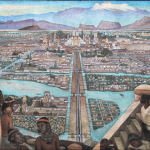
(Wikimedia Commons public domain photo by Gunawan Kartapranata)
This is important because Islamic law covers a far wider range of actions than anything we know of as law in our own experience. After centuries of analysis and refinement, Muslim legal thinkers worked out a system in which all possible human acts were placed into one or another of five classes. Some were “obligatory” These actions must be done by every person. (Prayer will serve as a good example.) Others were merely “desirable.” It would be good to perform these acts, but a person would not be punished if he or she did not do so. While becoming a scholar of Islamic law is a good thing, for instance, a peasant will not be punished because he is not such a scholar. Nor, among educated people, will a doctor or an engineer be condemned simply because he or she has chosen a different but respectable career path. A third category comprises acts to which the law is “indifferent.” Whether a man or woman performs one or another of these acts is of no concern to Islam. (Should Mahmud work as an accountant, or should he seek to be a doctor? The law doesn’t care.) There are also actions that the law considers “objectionable.” People who act in such ways will not be punished, but it would be better if they avoided such actions. (Slurping one’s soup is not a moral offense and will not land anybody in Hell, but it is still not exactly admirable behavior.) Finally, there are actions like adultery and murder that are simply “prohibited.” This fifth category of actions consists of things that all people should avoid and for which, if they do not avoid them, they will be punished.
Only two of these five categories of action fall within the scope of enforceable law, either in the West or the Middle East.[1] Our own legal system speaks of actions that are obligatory (paying taxes, for instance) and of actions that are prohibited (such as murder), but it is generally silent when it comes to mere recommendations and certainly has nothing to say about matters of indifference. The shariah, however, speaks explicitly about all of these topics and thus includes much more than our Western law. It makes no real distinction between legal matters as we understand them and actions that we would tend to think of as purely religious. Its provisions cover religious duties—what Muslims call “acts of worship,” such as ablution, prayer, and pilgrimage—but also embrace criminal law and rules of inheritance. It is a remarkable construction, and even where I disagree, I must confess that I admire the shariah’s vastness and intricacy, its comprehensive effort to show, in all aspects of life, what is involved in being a true Muslim. We might therefore think of it as a “grand ideal,” a portrait of the ideal human life and the ideal human society. And even though such ideals have certainly not been reached in Islam any more than they have been achieved in the West, it can be safely said that the shariah permeates all social life in Islamic countries even today and affects all aspects of their cultures.
But there is a problem. The shariah has never been fully implemented anywhere. Islamic legal theorists developed an approach to the law that does not recognize an intermediary or intercessor between God and man—contrary to some of the claims that were being made for the ever more powerful caliph—and allowed for neither priests nor ritual acts performed by one person on behalf of another. The rulers of the state soon discovered that this was not to their taste. They did not want to be bound by the detailed rules of Islamic law, which placed both caliphal government and ordinary citizen on an equal plane before the justice of God. So they ignored it. More precisely, they allowed Islamic law to govern in areas of life that they deemed beneath their notice. Thus, a dual system of courts was established. Islamic law was permitted to regulate marriages and divorces and estate questions, as well as certain commercial transactions, but it could not interfere with the ruler’s right to be arbitrary and self-seeking in his relationships with those beneath him. The caliphal courts, designed to handle questions in which the ruler took more urgent interest, were more likely to reach whatever verdict the government desired. Customary law and sheer whimsy were the only controls placed on the rulers of Islamic nations for most of the premodern era.
Later, the West began to penetrate into Muslim lands. Thereafter, it was to the Western code of legal rules—either the Napoleonic code or English common law—that the rising nation-states of the Near East often looked for guidance in constructing their own constitutions and legislation. They did not look to the shariah. From their point of view they had good reason. Islamic law was delivered to a prophet by God. In principle, it could not be modified or even adapted to modern circumstances. Nobody had the authority to do so. The situation was very similar to that in Judaism and the Hebrew Bible, where God himself is the lawgiver and no room is left over for human legislators.
Unlike the famous Babylonian Hammurabi, no Israelite king ever formulated a law-code.[2] Moses was a prophet, not a king. And Moses was not viewed as a sovereign law-giver, but rather as a transmitter of the will of God. Thus, from its very beginnings, Jewish law like Islamic law made no distinction between religious and secular, sacred and profane. All aspects of life were thought of as one. And, just as in the Islamic shariah, no difference was drawn between civil and criminal law on the one hand and moral law on the other. More important for my intent and purpose here, the law was regarded by both Jews and Muslims as something divinely delivered rather than humanly evolved. Accordingly, Islamic rulers who wanted a legal system that they could tinker with, whether for their own benefit or for the actual benefit of their people, avoided the shariah.
Today, the split personality of Middle Eastern law is under attack. Not only among Muslims but among Israeli Jews there are those who demand that their ancient God-revealed law codes be enforced by the coercive arm of the state. The issue has led to agitation in Pakistan and Egypt and other Muslim nations, and even to a civil war in the Sudan. In Israel, it is a matter of constant debate in parliament and in the newspapers, and it even played a role in disputes about the building of Brigham Young University’s Jerusalem Center for Near Eastern Studies.
[1] Adultery no longer seems to fall under this category in Western law—although it once did, and although it seems to be a clear case of breach of contract at the very least.
[2] Hammurabi actually claimed to have received his famous 282 laws from the god Shamash.












